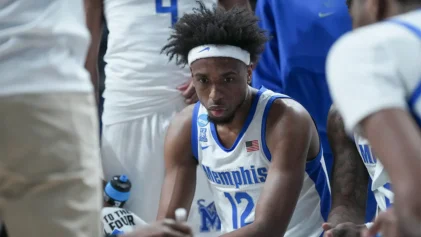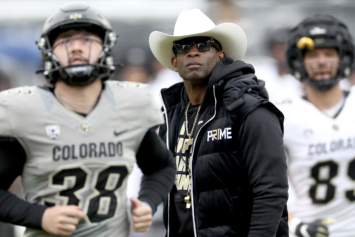The NCAA has denied Oklahoma State’s appeal of the postseason ban of its men’s basketball team. The school is not happy. Men’s basketball head coach Mike Boynton, when asked if he tried to get NCAA committee members to explain their decision to the team, said:
“They won’t, because weak leaders don’t answer questions.”
Oklahoma State was originally given a postseason ban in the summer of 2020, but the Cowboys appealed the decision and were allowed to play while under appeal. That team was led by 2021 No. 1 NBA draft pick and now Detroit Pistons rookie Cade Cunningham.
The NCAA also placed Oklahoma State on three years’ probation and reduced the team’s scholarship limit, imposed several recruiting restrictions. All of these penalties are a result of the 2017 FBI investigation into college basketball corruption.
The NCAA Must Take Its Share Of Blame In The FBI Recruiting Scandal
But the upholding of this ban is ridiculous. One player received a $300 benefit. He served his suspension and repaid the money. The former assistant coach whose activities brought the feds to the program’s door, Lamont Evans, pleaded guilty in 2019 to accepting thousands of dollars in bribes to connect players with sports agents and already has been sentenced to three months in prison. Not to mention Oklahoma State self-reported the violation.
“I’m disappointed, disgusted, appalled, frustrated — but somewhere in Indianapolis there’s a group of people celebrating,” Boynton said, in a reference to the NCAA. “They won. Our players don’t deserve and shouldn’t have to deal with this.
“It was a single NCAA violation. One player received $300. One player. Not a recruit. Not a future recruit. Not a family member. One current player received $300. And in and of itself, because it was self-reported by us, it’s a secondary violation. So the punishment is you pay the money back, serve your suspension — which the kid did — and you move on.
Many say the NCAA is a corrupt cartel that picks and chooses how it metes out punishment. Long seen as a hypocritical organization that exploits athletes under the guise of amateurism, this decision is truly not surprising.
The NCAA operates in service of itself, not its member institutions or the “student-pathletes” that generate billions in revenue.
Jalen Rose: “NCAA’s Financial Dominance Over Its Athletes Is Steady Crumbling”
Boynton was emotional during the Nov. 3 news conference after the NCAA decision was announced, and understandably so. For his athletes, they are being robbed of something they’ve worked tirelessly for.
Mike Boynton speaks candidly on the process of appeals.
Says the NCAA made him fly to Atlanta the day before a Bedlam game and a hearing was also held THE DAY OF a game against Kansas.
The raw emotion is so hard to watch. pic.twitter.com/fPKiKrcwdb
— Tyler Wiederhoeft (@TDWiederhoeft) November 3, 2021
“It’s no wonder that nobody trusts [the NCAA]. They don’t have to come and do this, and answer questions, and talk to kids, and talk to parents.”
So far Oklahoma State is the only school to receive penalties as a result of the FBI investigation, although both Auburn and Arizona implemented postseason bans on themselves last year. Both USC and South Carolina — where Evans employed the same scheme before coming to Oklahoma State in 2016 — have avoided punishment.
That inconsistency irritates Boyton.
“There have been some results that have been very different from ours with very similar circumstances involved. And that makes it even more frustrating,” Boynton said. “The cases have similar circumstances and the consequences are drastically different. And that’s utterly ridiculous.”
When the name, image and likeness benefits for college athletes were enacted, the thought was maybe things were changing and the NCAA was losing some of its self-given power.
But decisions like Wednesday’s show we still have a long way to go.



